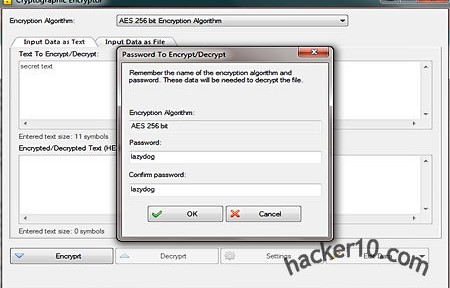VSEncryptor is a free file encryption tool to secure messages and files, it comes with customization options allowing you to choose the cipher, AES128/192/256bit, RC2/RC4 stream encryption algorithm and DES or 3DES. During installation pay attention to avoid an adware toolbar from being introduced in your computer, you will also be asked if you would like to integrate VSEncryptor with Windows shell menu to quickly encrypt single files right clicking on them, this can be changed later on in options.
The software interface is very easy to understand, with just four buttons “Encrypt“, “Decrypt“, “Settings” and “Edit Data“, if you use it often you can manage all of the options with the shortcuts that come predefined in settings, the interface skin can be changed. After encrypting a file it will be recreated with the extension .encrypted but you can change the default extension to anything you want, optionally use the command line to manage VSEncryptor.

For high security encryption you should stick to the tried and tested AES256 cipher and set it as default in settings, the RC4 algorithm is normally utilized to encrypt streaming data in SSL and WPA, it can be vulnerable to attack when not used with a strong message authentication code (MAC). I was a little surprised that the developer referred to the RC4 algorithm by its original name, since it is trademarked by RSA Security and the encryption community often refers to it as ARCFOUR or ARC4 to avoid copyright problems. The DES algorithm is crackable using a brute force attack due to its poor 56bit keylength, TripleDES as the name suggests, triples DES keylength and there is no known way to crack it but AES has been much more widely analized by cryptographers and it is a US Department of Defence standard, it should be your first cipher choice.
If you need simple encryption and trust closed source software or have low security needs, VSEncryptor should do the job, just remember that people receiving your encrypted text of files will need to own the same software to decrypt the data.

Leave a Reply